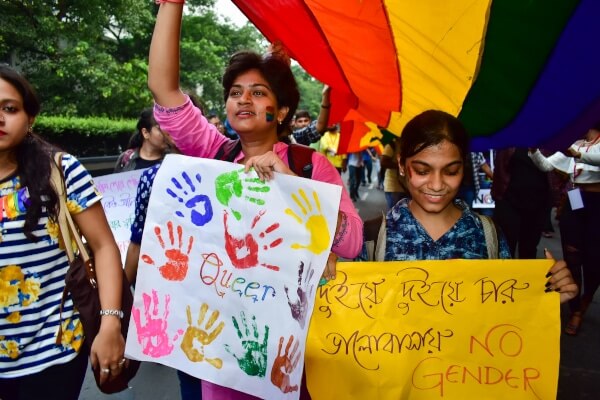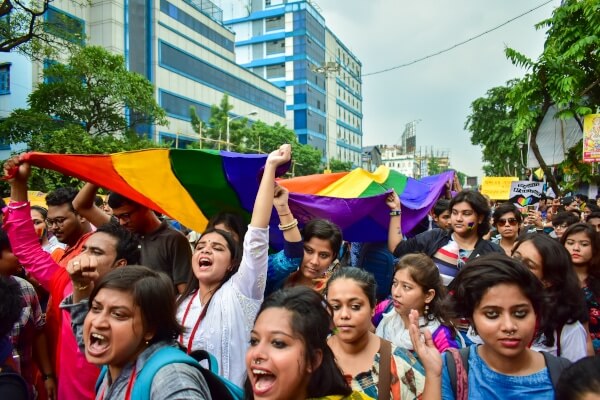India’s Supreme Court has refused to legalise same-sex marriage, with the country’s chief justice saying it’s the responsibility of parliament to create laws recognising same-sex unions.
A five-judge bench, headed by Chief Justice Dhananjaya Yashwant Chandrachud gave their verdict on Tuesday, with a 3:2 majority ruling against petitions heard in April and May of this year.
According to the verdict, creating law around same-sex marriage is outside the scope of the Supreme Court, judges recommending the Government instead establish a committee headed by the Cabinet Secretary to decide the rights of same-sex couples.
The decision has been met with disappointment and anger from the LGBTQIA+ community in India, who had hoped for constitutional recognition of their right to marriage equality. LGBTQIA+ advocates around the world have also expressed their dismay, with Trikone Australia saying on Facebook “the decision is a setback for marriage equality”.
I am angry. You failed us. We are tired of being second class citizens. #EqualityForAll #SupremeCourtofIndia #inclusion #marriageequalityindia pic.twitter.com/XAUEqps5TP
— Supriyo Chakraborty (@c_supriyo) October 18, 2023
Graeme Reid, director of the LGBT Rights program at Human Rights Watch, hopes the Government will follow through with the court’s recommendations.
“This ruling has come as a huge disappointment to many in the LGBTQIA+ community in India and around the world, who were looking to the Indian Supreme Court to set the benchmark for equal rights,” he said in an online statement. “The government should act on the court’s recommendation to bring the legislative change.”
Over 21 petitions were filed in the collective lawsuit to amend India’s Special Marriage Act of 1954 permitting civil unions across religion to include same-sex couples.
🏳️🌈🇮🇳 My Statment on #SameSexMarriage Case by #SupremeCourt
For Media Only – +91 9920879663 pic.twitter.com/BHFBWXj6ps
— Ankit Bhuptani 🏳️🌈 (@CitizenAnkit) October 17, 2023
The petitioners argued the lack of legal recognition for same-sex marriage violated their constitutional rights, citing significant barriers to accessing healthcare, education, and employment, difficulties exercising rights such as adoption and property ownership, and social discrimination.
Though opposing discrimination against same-sex couples, the Supreme Court verdict has ascribed no ‘fundamental right’ to marriage equality under the constitution, meaning the state are not obligated to recognise same-sex unions.
Harish Iyer, a prominent LGBTQIA+ activist and petition mover, has expressed his frustration at this decision.
Im tired. broken. wounded. I hve endured homophics all day. today, decisions and views about how I don’t deserve the privileges they enjoy without ever getting questioned for it. But I am not going back. I shall fight. Marriage equality will be a truth in my lifetime. Promise.
— harish 🏳️🌈 (he/she) (@hiyer) October 17, 2023
Tuesday’s verdict follows a landmark victory for LGBTQIA+ rights in 2018, where the Supreme Court unanimously overturned a colonial-era law criminalising gay sex.
The Indian Government, led by Prime Minister Narendra Modi, are yet to comment on the latest verdict, but have previously opposed the petitions, describing them as ‘urban elitist views’ and declaring same-sex marriage to not be ‘comparable with the Indian family unit concept of a husband, a wife and children.’
Justice Chandrachud responded to these assertions in Tuesday’s verdict, saying “homosexuality or queerness is not an urban concept or restricted to the upper classes of the society.”
Whilst declining to recognise same-sex marriage, the Supreme Court recognised the transgender community’s right to marry under a heterosexual relationship.

Justice Chandrachud also asked the government to protect the queer community from harassment and violence, saying “equality demands that queer unions and queer persons are not discriminated against.”
Anish Gawande, co-founder of PinkList, India’s first archive of politicians supporting LGBTQIA+ rights, feels these words don’t go far enough.
“This isn’t about the denial of marriage rights. This is about five judges of the highest court of the land thinking that queer people are not important enough. Not important enough to set judicial precedents for, not important enough to engage in judicial interpretations ‘beyond a point’,” he said in an online statement.
According to activist estimates, India has around 135 million LGBTQIA+ people, or 10% of the country’s population.
Not Enough….. For how long do we wait for majoritarian vote bank based morality to regulate our lives.
— iamOnir (@IamOnir) October 17, 2023
Though still regarded as taboo in conservative Indian society, attitudes towards the community are changing, with a Pew Research Centre report finding 53% of Indians support the legalisation of same-sex marriage.
Despite this, Nepal and Taiwan remain the only countries in Asia where same-sex unions have been legalised.
READ ALSO: Onir: ‘Why are straight people still telling our stories?’




